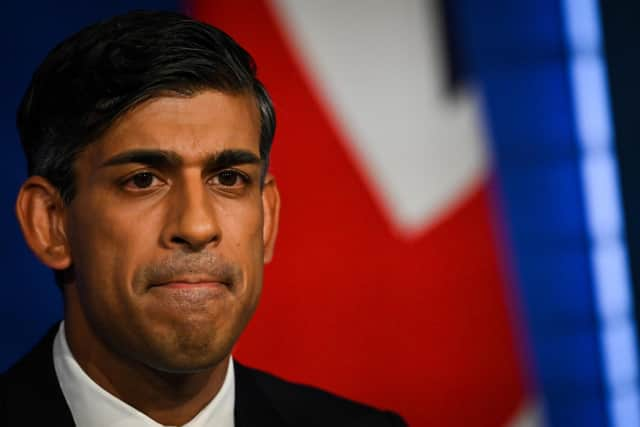Rishi Sunak has turned climate change into a wedge issue with net zero speech - Justine Greening
For others it may feel like it can’t come a moment too soon. Nevertheless, we seem set for one of the longest run-ins to a General Election since the 1997 General Election when then Prime Minister John Major waited as long as he could.
It’s often said that Opposition parties don’t win elections, it’s Governments that lose them. But with the polls showing a consistent 15 point or more lead for Labour, getting back into power must feel tantalisingly close for Labour leader, Sir Keir Starmer. Even so, with months and many hard political yards ahead, there is plenty that can happen between now and election day to derail his hopes of becoming the first Labour Prime Minister in 14 years.
Advertisement
Hide AdAdvertisement
Hide AdAnd as this week shows, there’s no doubt that the current Prime Minister Rishi Sunak will come out fighting as he tries to avoid being a Conservative Party leader that crashed his party’s fortunes and led it to defeat.


This week’s speech by Mr Sunak charting a fresh course for Britain to reach net zero by 2050 looks set to be the first of a series of interventions setting out his vision for how Britain should change. He is responding to pressure from his own Parliamentary Party to be clearer on a long-term plan. But if his net zero speech is anything to go by, he and his party could be in for a rocky ride.
Because whilst the Prime Minister talked about a new politics, in practice, the politics deployed was very much in the vein of that we’ve seen in recent years - the politics of division. Sunak’s speech made political capital by breaking the cross-party consensus on tackling climate change. It was a highly political speech intended to use net zero and climate change as a ‘wedge issue’. It has succeeded in that objective, perhaps much more than intended, because it has proved controversial even within his own party let alone a wider country.
Sunak is listening to those voices in his party urging him to wage more culture wars and use identity politics to win the next election. But what if he’s picked the wrong identity, one that too few voters share? And if the new sort of politics he talked about is normalising half-truths, claiming to scrap policies that never existed in the first place (who knew we faced a meat tax?), then it’s a step towards a US-style of politics that is sliding that country towards an ever deeper democratic crisis where voters trust no one.
Advertisement
Hide AdAdvertisement
Hide AdAs for Labour, the biggest test for a party out of office for so long, as I know from my own time in Opposition, is that it isn’t enough to become an effective Opposition. Labour must go beyond that to become a credible Government-in-waiting that voters want to choose. That requires not just opposing the current Government’s policies, but coming up with policy alternatives that are better. It’s clear Sunak’s upcoming speeches are also designed to bounce Labour into taking policy positions before it is necessarily ready. And the party can expect far greater media scrutiny on its own plans for Government in the time ahead.
However, it seems that there is at least the beginnings of an understanding in Labour that any Government after a 2024 General Election, will need a very different playbook to Labour Governments that have gone before. Britain’s post-covid cash strapped public finances mean there is no money to throw around for a party that has traditionally been ‘tax and spend’ in mindset.
For whoever wins the election, Labour or Conservative, it’s less about increasing taxes to pump more money around a bad system and more about changing the system itself to make it fairer and better for all. That is a far more intelligent and sustainable approach to address root causes of societal challenges such as inequality of opportunity.
It means working strategically with British business and employers to drive change. We’ve already seen how crucial business investment has been for the UK to be as far along the journey to net zero as it is.
Advertisement
Hide AdAdvertisement
Hide AdSimilarly it will be investment by businesses in skills and talent and far-sighted employers targeting new opportunities in the communities that need them, that will prove one of the most effective ways to deliver outcomes in the immediate years ahead. That needs long-term policy certainty from the Government, not the chopping and changing we saw this past week.
Businesses need an ‘enabling’ environment in which to invest more easily at scale in both people and planet. A Conservative Party that traditionally believes in a smaller rather than a larger state would ordinarily understand the crucial role our private sector must play and why certainty matters. It would also understand that those families facing the hardest challenges want a Government that is laser-focused on lifting their life outcomes rather than simply bringing forward approaches that ameliorate their present circumstances.
Whatever the polls say, for both parties, there is still a lot to play for. I believe voters deserve much more over the next 12 months than political playbooks containing only divisive, negative politics. People want to see not just what parties are against but what they are for. Let’s hope the party conference season provides us all with some more constructive answers and a positive vision for post-Brexit Britain.
Justine Greening, who was born and raised in Rotherham, is a former Secretary of State for Education.